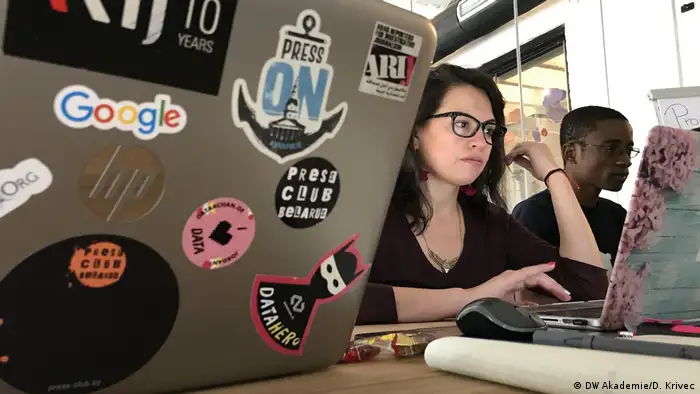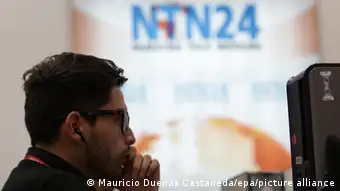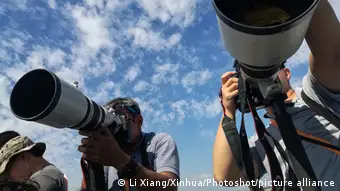Solidarity journalism
From "unbiased silence" to real support
Journalistic objectivity often means presenting various perspectives in a story equally. But what if that approach perpetuates injustice and marginalization? There is a compelling solution, argues Mariam Gersamia.
In our rapidly evolving world of advanced technology, we have become a more informed and interconnected society. Our increased awareness of global issues, human rights violations, and societal inequalities demands that we confront these challenges head-on without turning a blind eye. As journalism adapts to this changing landscape, a crucial question arises: Should journalism prioritize traditional objectivity or champion social justice? Solidarity journalism provides insights into how journalism can evolve and adapt in these transformative times.
Why solidarity journalism matters
While there is no one-size-fits-all answer to the objectivity vs. social justice dilemma, solidarity journalism presents a compelling alternative. It stands in solidarity with marginalized communities and vulnerable groups by emphasizing advocacy, support and empathy, and building supportive and positive micro-moments in media related to these groups. By working in this way, journalists can foster positive societal changes.
Albeit with different focuses and methods, solidarity journalism is similar in its goals to constructive journalism, peace journalism, and human rights journalism. All approaches are aiming to empower the audience to constructively engage with societal issues.
In traditional journalism, objectivity often meant presenting “both sides” of a story equally, regardless of the context. However, when dealing with sensitive stories like domestic violence, femicide, or homophobia, should the arguments and comments of the aggressor or bully carry the same weight as those of the victims? Solidarity journalism recognizes that neutrality in the face of injustice perpetuates harm and marginalization. Instead, it aligns with the rights of vulnerable groups and empowers their voices.
At the forefront of solidarity journalism is Anita Varma from the school of journalism and media at the University of Texas in Austin. She defines solidarity journalism as standing for basic human dignity and against suffering. This concept involves making news judgments, sourcing, and framing that prioritize the experiences of those facing unjust conditions. By breaking away from strict objectivity, solidarity journalism champions social justice.
Solidarity journalism is not activism
Striving for fairness and accuracy remains essential in reporting, and solidarity journalism adds an extra layer of social responsibility without compromising credibility. This is even more essential in today’s world where distinguishing between facts and lies has become increasingly difficult for the audience. By providing accurate coverage and support for vulnerable groups, solidarity journalism paves the way for a more inclusive and compassionate society.
Solidarity journalism can act as a watchdog for human rights and social justice issues. However, this responsibility can present a dilemma when solidarity journalism starts to resemble activism. To address human rights violations on a professional level, Varma suggests a commitment to social justice that translates into the action of reporting: while journalists may not directly join social movements, they can express moral solidarity in specific cases by prioritizing the voices, experiences, and perspectives of marginalized groups.
Key questions to advocate for change
To effectively practice solidarity journalism, journalists should consider the following essential questions and ensure clarity in their approach:
- Are basic human rights being disrespected in the situation being reported?
- Is the dignity of a particular group or community being questioned or undermined?
- What specific actions can journalism take to address social injustice and advocate for positive change while reporting?
- Whose perspectives and experiences are most relevant to the issue at hand, and how can journalists prioritize these voices in their reporting?
- How can journalists offer representation and inclusion of marginalized people's perspectives?
- Are there different angles to information provided by authorities that journalists can bring to light?
- How can media use its watchdog function to generate important questions from vulnerable groups and hold officials accountable, responsible, and transparent?
Building resilience and empowering communities
Solidarity journalism serves as a pillar of support during times of crisis and wartime. Striving for "balanced reporting" could accidentally promote the aggressor’s narratives and limit space for support for vulnerable groups. This highlights the shortcomings of "objectivity" when reporting on malevolent actions, refugees or war victims’ stories.
It is worth mentioning that journalistic standards evolve over time, adapting to different contexts. Notably, while covering terrorism, news editors often choose NOT to give a platform to terrorists, and a similar approach might be suitable to other violent groups and aggressors as well.
Solidarity journalism not only provides support during crises but also empowers communities to navigate challenging times. By enhancing collective stress resilience and promoting pro-social behavior, media can create a discourse that fosters support and empathy for vulnerable groups.
By standing in solidarity with marginalized communities and amplifying their voices, journalists can contribute to positive societal change and foster empathy and support during challenging times, build resilience and promote human rights worldwide.
Meanwhile, let’s remember 5 essentials of solidarity journalism (SJ5):
- SJ aligns with vulnerable groups, fostering empathy and support;
- SJ promotes an inclusive society for all by foresting a sense of shared purpose;
- SJ offers an authentic, unfiltered perspective during crises, tragic events and wartime;
- SJ builds collective resilience during crisis, tragic events and wartime and empowers communities by promoting pro-social behavior;
- SJ serves as a catalyst for social justice and human rights advocacy.
Mariam Gersamia is a media psychologist and professor at Tbilisi State University. She is the founder of the educational and research center "Media Voice" and media program manager at Transparency International Georgia.
DW recommends
- Date 11.09.2023
- Author Mariam Gersamia
- Feedback: Send us your feedback.
- Print Print this page
- Permalink https://p.dw.com/p/4VnZQ
- Date 11.09.2023
- Author Mariam Gersamia
- Send us your feedback.
- Print Print this page
- Permalink https://p.dw.com/p/4VnZQ




